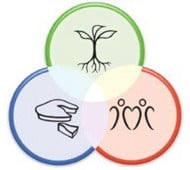Hello! Thank you for creating this community. I hope these sort of text discussion posts are okay.
I’d like to know - how do people here practice permaculture? What sort of habits have you created? What sources do you learn from?
I’m a suburb-bound person who is constantly trying to bring more permaculture practices into my life, and spaces that show me what others are doing really help.


Same with me! Project Gutenberg has so many gardening e-books about closed cycle farming, they just called it something else in the 1860s🤯
That is extremely interesting! Do you have a few examples of what to look for?
“Ten Acres Enough” by Edmund Morris is excellent for how to select and develop a small amount of land for a commercial orchard as well as a homestead. It was written in the 1860s, I keep coming back to it for advice on homesteading, setting up outbuildings and long-term, closed-cycle farming. Chickens, dairy, orchard, cash crops- he covers it. It’s also an enjoyable read in and of itself. “Compost Everything: The Good Guide to Extreme Composting” by David the Good, that’s his nom de plume, available to buy, worth the money. Another Gutenberg treasure: “Dry-Farming, a System of Agriculture for Countries a Low Rainfall” by John Andreas Widtsoe. This is a must-have from 1910, even if you don’t happen to live in a area with low rainfall. I had no idea how a rainfall or flooding creek causes erosion and why some soils wash away and others don’t. He explains in plain English how to fortify your soil against excessive erosion, no matter what type of soil you have. Enjoyable read and will change the way you look at the soil outside your window, wherever you live. “Crops and Methods for Soil Improvement” by Alva Agee, more technical, but easy to understand for the layman.
“Farmers of Forty Centuries; Or, Permanent Agriculture in China, Korea and Japan” by F.H. King. This is the Bible of closed-cycle farming to feed millions of people on tiny patches of land without exhausting the soil and water resources. F.H. King traveled on foot and by horse-drawn vehicle through these countries for decades, he listened to the lessons offered by peasant sharecroppers, fish farmers, poultry raisers and orchardists through translators. It’s also a really fascinating travelogue. I keep coming back to this one whenever I get discouraged with a project, i.e., fruit trees that don’t seem like the pH of my two acres of old pasture. Those farmers had much less and never gave up.
This is a treasure box - thank you so much for your time and thoughtful comments!
You’re welcome. Happy reading!